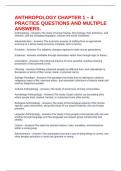ANTHROPOLOGY CHAPTER 1 – 4
PRACTICE QUESTIONS AND MULTIPLE
ANSWERS.
Anthropology - Answers-The study of human beings, their biology, their prehistory, and
histories, and the changing languages, cultures and social institutions.
Industrialization - Answers-The economic process of shifting from an agricultural
economy to a factor based economy. Example: farm to factory
Evolution - Answers-The adaptive changes organisms make across generations.
Empirical - Answers-Verifiable through observation rather than through logic or theory.
Colonialism - Answers-The historical practice of more powerful countries claiming
possession of less powerful ones.
Othering - Answers-Defining colonized peoples as different from, and subordinate to,
Europeans in terms of their social, moral, or physical norms.
Salvage Paradigm - Answers-The paradigm that holds that its important to observe
indigenous ways of life, interview elders, and assemble collections of objects made and
used by indigenous people.
Cultural Anthropology - Answers-The study of social lives of living communities.
Archaelogy Anthropology - Answers-The study of past cultures, by excavating sites
where people lived, worked, farmed, or conducted some other activity.
Biological Anthropology - Answers-The study of the biological aspects of the human
species, past and present, along with those of our closest relatives, the non-human
primates.
Linguistic Anthropology - Answers-The study of how people communicate with one and
another through language and how language use shapes group membership and
identity.
Culture - Answers-The taken-for-granted notions, rules, moralities, and behaviours
within a social group.
Ethnocentrism - Answers-The assumption that one's way of doing things is correct, and
other peoples practices or views are ignorant or wrong.
,cultural relativism - Answers-the moral and intellectual principle that one should withhold
judgement about seemingly strange or exotic beliefs and practices
Diversity - Answers-the sheer variety of ways of being human around the world
Holism - Answers-efforts to synthesize distant approaches and approach and findings
into a single comprehensive interpretation.
Scientific method - Answers-The standard methodology of science that begins with
observable facts, generates hypotheses from these facts, and then tests these
hypotheses.
Theory - Answers-A tested and repeatedly supported hypotheses.
Quantitave Methods - Answers-A methodology that classifies features of a
phenomenon, counting, or measuring them, and constructing mathematical and
statistical models to explain what is observed.
Qualitative methods - Answers-A research strategy that produces an in-depth and
detailed description of social behaviour and beliefs.
Ethnographic method - Answers-A research method that involves prolonged and
intensive observation of/and participation in the life of a community.
Comparative method - Answers-A research method that derives insights from a
systemic comparison of aspects of two or more cultures or societies.
Applied Anthropology - Answers-Anthropological research commissioned to serve an
organization's needs.
Practicing Anthropology - Answers-anthropological work involving research as well as
involvement in the design, implementation, and management of some organization,
process, or product
Ethics - Answers-Moral questions about right and wrong and standards of appropriate
behaviour.
Action anthropology - Answers-An approach to anthropological research that seeks to
study and, at the same time, improve community welfare.
What are the four fields of anthropology? - Answers-cultural, biological, linguistic,
archaeology
How did anthropology begin? - Answers-19th century:
-Industrialization: rapid social changes promote new questions about the nature of
society
, -Theory of Evolution: From biologists to social theories to explain human differences
-Colonialism: Need to govern other people as an incentive to study them
What do the four fields of anthropology have in common? - Answers-Shared history and
fundamental approaches to understand humanity complexity:
-culture: the taken-for-granted notions, rules, moralities, and behaviour within a social
group.
-culture relativism: the moral and intellectual principle that one should seek to
understand cultures on their own terms and withhold judgment and seemingly strange
or exotic beliefs and practices.
-diversity: the sheer variety of ways of being human around the world.
-change: our world is dynamic and always changing.
-holism: efforts to synthesize distinct approaches and findings into a single
comprehensive interpretation.
How do anthropologists know what they know? - Answers-Scientific methods:
theories, quantitate data research, qualitative data research, ethnographic research
methods, and comparative research methods.
How do anthropologists put their knowledge to work in the world? - Answers-Applied
and practicing anthropology:
Applied anthropology: anthropological research commissioned to serve an
organizations needs.
Practicing anthropology: Anthropological work involving research as well as involvement
in the design, implementation, and management of some organization, process or
product.
What ethical obligations do anthropologists have? - Answers-Issues of ethics - moral
questions about right and wrong and standards of appropriate behavior - are at the
heart of anthropology.
Doing no harm - having "informed consent" after explaining potential risks of
participation in research, and making participants anonymous if it could cause harm to
them.
an anthropologist who runs tests on how modern humans walk and what evolutionary
mechanisms were at play would most likely be a(n) - Answers-physical anthropologist
an anthropologist doing a project on how to internet and text message technology have
changed how we communicate would most likely be a __________ anthropologist -
Answers-linguistic
an anthropologist who studies how Levi's jeans are affecting fashion among rural
Indonesians is a(n) - Answers-cultural anthropologist
the observation of a phenomenon followed by a hypothesis, experimentation, testing of
theories, and descriptions of finding is called - Answers-the scientific method




